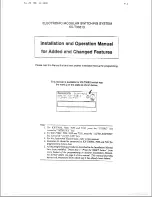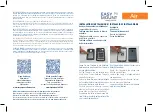
GWS 10 Installation Instructions
EN
Creating a Basic NMEA 2000 Network for the GWS 10 and the GMI 10
If you do not have an existing NMEA 2000 network, you will need to install a NMEA 2000 network on your boat. For more information on
NMEA 2000, visit
.
1. Connect two T-connectors together by their sides.
2. The NMEA 2000 power cable must be connected to a 9–16 Vdc power source through a switch. Connect to the ignition switch of the boat or
through an appropriate additional switch (not included).
3. Connect the NMEA 2000 power cable to one of the T-connectors.
4. Connect the NMEA 2000 drop cable to the other T-connector and to the GMI 10 or any other NMEA 2000-capable display.
5. Add additional T-connectors for each sensor (not included) that is added to the NMEA 2000 network, and connect each sensor to a
T-connector with the appropriate drop cable (not included).
6. Connect the female terminator to the appropriate end of the combined T-connectors.
CauTiON:
Connect the included NMEA 2000 power cable to the ignition switch of the boat or through an external switch. The GMI 10 and GWS 10
will drain the boat battery if they are connected directly to the battery.
+
-
GMI 10
T-connectors
NMEA 000 backbone cable
GWS 10
Field-installable connector
NMEA 000
power cable
In-line terminator
In-line lightning
arrestor
NMEA 000 drop
cable
NMEA 000
drop cable
Female terminator
Basic NMEA 2000 Network with a GMI 10 and a GWS 10
Configuring the GWS 10
Refer to your Garmin Chartplotter or marine instrument owner’s manual for specific instructions regarding configuring NMEA 2000 devices.
To configure the orientation:
1. Select
Wind Angle Offset
if you did not orient the GWS 10 facing the exact front of the boat.
2. Select the angle (in degrees) to adjust for the difference in orientation.
Tip:
The angles are configured clockwise around the mast of the boat. For example, 90 degrees is starboard while 270 degrees is port.
To adjust the filter settings:
1. Select
Wind Angle Filter
.
2. Choose from the following settings to adjust the filter:
Off
—turn off the filter to make the display more sensitive to changes in the wind angle.
On
—select a higher number to increase how responsive the display is to changes in the wind angle, or select a lower number to
decrease the responsiveness.
Auto
—automatically adjusts the filter settings based on wind conditions.
3. Select
Wind Speed Filter
.
4. Choose from the following settings to adjust the filter:
Off
— turn off the filter to make the display more sensitive to changes in the wind speed.
On
—select a higher number to increase how responsive the display is to changes in the wind speed, or select a lower number to
decrease the responsiveness.
Auto
—automatically adjusts the filter settings based on wind conditions.
•
•
•
•
•
•





































